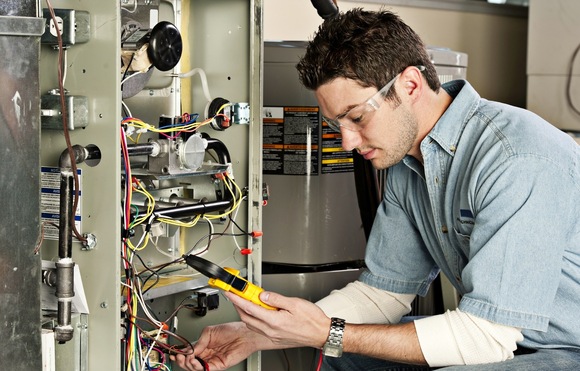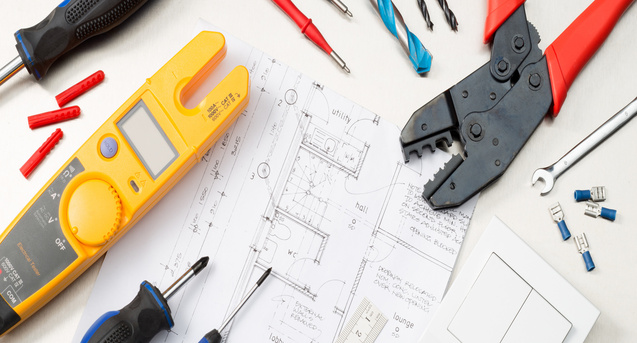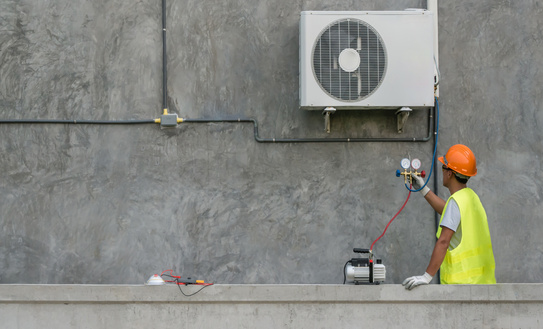Medical assisting is an in-demand healthcare occupation that is vital to the day-to-day operation of healthcare facilities across the country. If you’re considering a career as a medical assistant, you likely have questions about the education and training involved, as well as the everyday tasks of the job. Here are some questions to ask before committing to medical assistant school, along with some helpful information:
DM19_221_Coyne_MA_questions_InfographicMonth: July 2019
Alumni Spotlight: Walter Arzet – HVAC
Walter Arzet exercised due diligence before deciding to go into the Heating Ventilation Air Conditioning industry. It paid off, though, because he found his true passion – and lifelong career.
Arzet, a 1986 graduate of Coyne College in Chicago, was undecided about what to do after high school. “I talked to people, and I went to the schools: three different schools, three different trades,” he says. “You want to get to the source of why people are doing it or don’t want to do it.” That meant talking to people who were working in the field before enrolling in Coyne’s HVAC program.
What to Expect from a Medical Assistant Certification Exam
Certification can be a valuable credential for medical assistants. Not only is it an indicator of your skills and knowledge, it can also help you stand out among other candidates and appear more marketable to future employers. You may be required to earn certification depending on your employer.
There are a few different bodies that offer medical assistant certifications, such as the National Center for Competency Testing and American Association of Medical Assistants (AAMA). For the purposes of this blog, however, we’ll focus on the RMA exam issued by the American Medical Technologists (AMT).
Passing the RMA won’t be easy. It will test your general knowledge, administrative knowledge and clinical knowledge of the medical assisting profession. Here are some helpful tidbits to know for when you’re preparing to earn your RMA certification from AMT.
Exam structure
AMT’s RMA exam consists of anywhere between 200 and 230 questions, all multiple choice. The questions on the exam are weighted depending on their difficulty. It is also in your best interest to eliminate options you know to be incorrect, as picking an answer that is the second-best will still help your score more than the worst answer.
For example, if the answer to a question is “femur” and you choose another leg bone, perhaps “tibia,” you are likely to be rewarded more than someone who answers “scapula.” The scoring system can be confusing, so you’ll want to read up on it prior to taking the exam. For this, AMT’s Candidate Handbook is a great resource.
Exam timing
The AMT’s RMA exam has a time limit of two hours. With at least 200 items on the exam, you’ll have to pace yourself to make sure you have enough time to answer them all. Taking practice exams is a good way to learn how to effectively budget your time over the course of the exam. Managing your time spent on questions will help you save more time for the harder ones while you breeze through those you know like the back of your hand.

Subject matter
AMT’s RMA exam is designed to test your general knowledge of medical assisting across many areas of the discipline. The exam covers four major subject areas: anatomy and physiology, administrative medical assisting, clinical medical assisting and clinical patient interaction.
The RMA exam is not divided into subjects, so you need to be prepared for a question from any of these categories at any time. You can find a more complete rundown of material that is on the exam in AMT’s RMA exam outline.
Study resources available
AMT offers an abundance of resources to help guide you in your studies for the RMA exam. These include a list of suggested readings and references, as well as online review courses that are available for a fee.. AMT’s website is full of other helpful study resources as well. These handy resources can help you make the most of your time spent preparing to ace the RMA exam and earn your RMA certification.
Practice exams
Speaking of resources, some of the most helpful ones available are online practice exams. These are also available through the AMT for a fee. Medical assistant practice tests give you a feel for what the real exam will be like and can help you figure out which subject areas you need to focus on most in your preparation. Depending on your medical assisting school, practice exams may be available for free or at a discounted rate.
Before you get ready to take the RMA, you need to learn the skills. There’s no better place in Chicagoland to do that than Coyne College.
Launch your medical assisting career at Coyne
Coyne College’s Medical Assistant program is your first step to becoming a medical assistant. Coyne’s medical assisting program will equip you with the necessary skills and knowledge you need to succeed in a booming profession.
You’ll take courses in subjects like medical terminology, pharmacology and medical billing, taught by our experienced instructors. We’re so dedicated to your success that our curriculum includes a 6-week portion on electronic health records and a required externship.
You can complete our program in as soon as 54 weeks, meaning you can be ready for an entry-level role in a little over one year. We offer day options at our campus in the heart of the Chicago Loop.
Learn more about the medical assisting program at Coyne College in Chicago by calling us at 800-720-3990 or visiting coynecollege.edu today!
Electrical Safety Checklist for Your Home
Electricity in homes has become fairly essential to our everyday lives. For all of its advantages and capabilities, electricity in the home can be quite dangerous. Many dangers relating to electricity in homes are related to the potential for it to start fires. That’s why it’s crucial to take the proper safety precautions. Using this electrical safety checklist can help protect your home, your family and yourself while reaping the benefits of electricity and everything it powers.
Make sure your alarms are working properly
As noted earlier, fires are perhaps the biggest threat electricity poses to your home. That being said, smoke alarms are essential to your home’s fire safety. Make sure your smoke alarms have healthy batteries and replace them if necessary. It’s also a good idea to test them once a month and change the batteries every six months, according to the U.S. Fire Administration.
Use surge protectors
If you’re not doing so already, you should use a surge protector to connect various appliances to their power outlet. The surge protector keeps your appliances safe by diverting excess voltage to the outlet’s grounding wire in the event of a power surge, as is the case of lightning striking a power line. Surge protector power strips also allow you to plug more than a single device into an outlet. It’s important to not overdo it, though.
Check cords, outlets and light bulbs for damage
Frayed electrical cords are major fire hazards. Take a look at any extension cords you may be using to ensure they are working and not damaged. While inspecting extension and appliance cords, be sure to note the condition of your home’s outlets as well. You’ll also want to make sure the cords aren’t exposed to any water, which is also a safety hazard. Check all the light bulbs in your home, too, and double-check that they’re the right wattage.

Replace filters
One of the primary causes for reduced circulation in a house is a dirty air filter. Restricted airflow results in your heater or air conditioner having to work harder to heat or cool your house. The harder or more often they run, the more you’ll be paying for them on your electric bill. You’ll also want to clean or replace the filters on your refrigerator and range exhaust hood. Cleaning your dryer duct is crucial as well, as it’s very easy for too much lint to catch fire.
Check your appliances
Conduct an inspection of your home’s appliances to make sure they’re all working correctly. Ones that aren’t functioning properly or won’t turn on could be an indication of faulty electrical components. There may also be dust or debris that is hindering their function, as is commonly the case with refrigerators and dusty refrigerator coils. You’ll also want to unplug any appliances that aren’t being used. Not only will it reduce the likelihood of an electrical fire, but it’ll also cut down your electric bill.
Schedule an inspection
When in doubt, have a pro check it out. If you’re uncertain about the state of your home’s electrical wiring, don’t hesitate to have a professional electrician perform an inspection. They are able to tell you if everything is running smoothly and if there is a problem, they can help you fix it sooner rather than later. Sometimes early detection can be the difference between a simple inexpensive fix and a costly home repair.

These tips can go a long way toward making your home safer and prevent electrical fires.
How would you like to help keep families and homes safe by using electrical skills and knowledge to conduct inspections? At Coyne College in Chicago, you can train to become a field-ready electrician.
At Coyne College in Chicago, you can choose from two electrical work training programs: Electrical Construction and Planning and Electrical Construction and Maintenance. In either program, you’ll learn the essentials of electrical work in a setting dedicated to your individual success. Coyne College’s highly knowledgeable instructors have years of practical, real-world experience and are eager to help you make the most of your education.
As a student in Coyne College’s electrician programs, you’ll gain comprehensive knowledge about relevant subjects, such as, such as:
- Electrical and Electronic Principles
- Electrical Test and Equipment Safety
- Electrical Construction – Residential
- Electrical Theory and Applications
In addition to flexibility and quality instruction, Coyne College’s career services department can help you with job placement, including apprenticeships. Coyne College has more than 120 years of experience in helping transform students with dreams into qualified, skilled trade professionals. With day and night options available at our Chicago Loop campus, we’re committed to helping you fit a skilled trades education into even the busiest of schedules.
Discover everything Coyne College has to offer and begin your journey to a new career today by logging on to CoyneCollege.edu or call us at 800-720-3990.
HVAC Technician Career Facts and Forecast
An HVAC technician career is important as there’s no getting around the fact that people need HVAC systems to maintain comfortable environments indoors. This means talented individuals who work on HVAC systems, HVAC technicians, are and will continue to be important members of the labor force. Here are some quick facts about HVAC technicians and some insight as to what the future holds for the profession.
At Coyne College in Chicago, you can earn a HVAC-R diploma in less than a year. At the end of the program, you’ll be equipped with the technical skills and knowledge to begin your career in the HVAC industry thanks to our knowledgeable instructors. To learn more about all Coyne College has to offer, visit us at coynecollege.edu.
HVAC Technician Career Facts Coyne College






